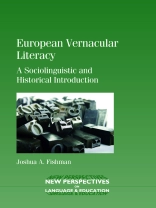In this major new text, Joshua Fishman charts the rise of vernacular literacy in Europe, and the major social, economic, religious, political, demographic, educational and philosophical changes that attended it. Following the story up until the present day, the book examines the people who became leaders of the growth of vernacular literacy in Europe, and looks at how European colonizers viewed vernacular literacy efforts in their current and former colonies. Looking forward, Fishman discusses how new technology affects vernacular literacy both now and in the present, and whether developments in voice and visual media mean that vernacular literacy will be less important to future generations than it is to us. ‘European Vernacular Literacy’ is not only a review of well-known facts and theories of the rise of vernacular literacy in Europe, but an attempt to reintegrate and rethink them along new and provocative lines, meaning that the book will be of interest not only to students of literacy and history but also to scholars interested in Fishman’s latest contribution to sociolinguistics.
表中的内容
1. Why has Interest in Languages and Literacies Increased So Much Lately?
2. What is a ‘Language’ of Vernacular Literacy?
3. The Rise of Vernaculars of Literacy in Europe
4. Macro-factors in the Societal Spread of Vernacular Literacy
5. Heroes of European Vernacular Literacy
6. Micro-factors in the Societal Spread of Vernacular Literacy
7. The ‘Literacy Bullies on the Block’
8. Literacy for What Purpose?
关于作者
Joshua A. Fishman is retired Emeritus Distinguished University Research Professor (Yeshiva University and Stanford University) and a frequent award recipient, lecturer, and publisher. He is also the co-founder of the field of sociolinguistics and founding editor of The International Journal of the Sociology of Language.












